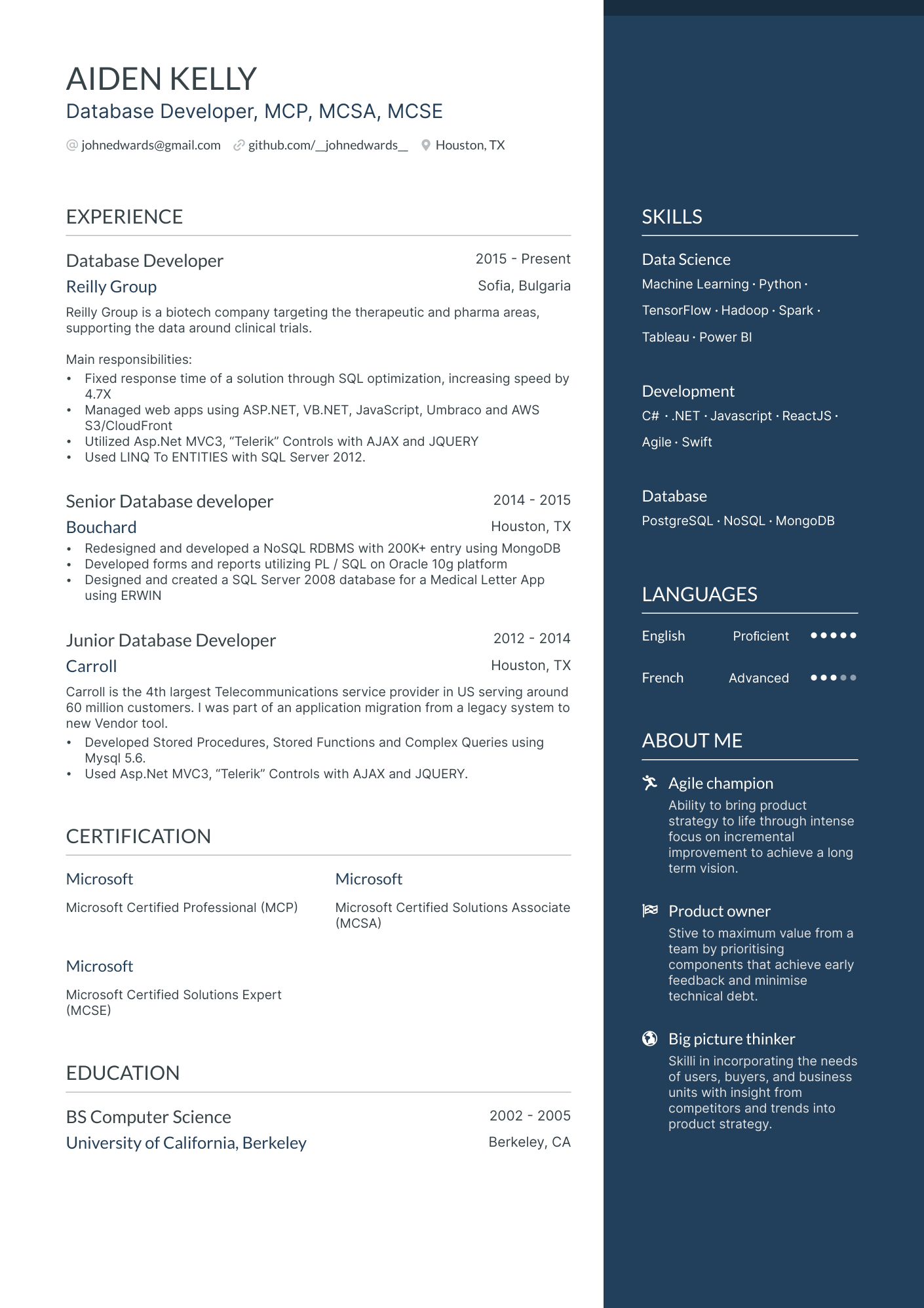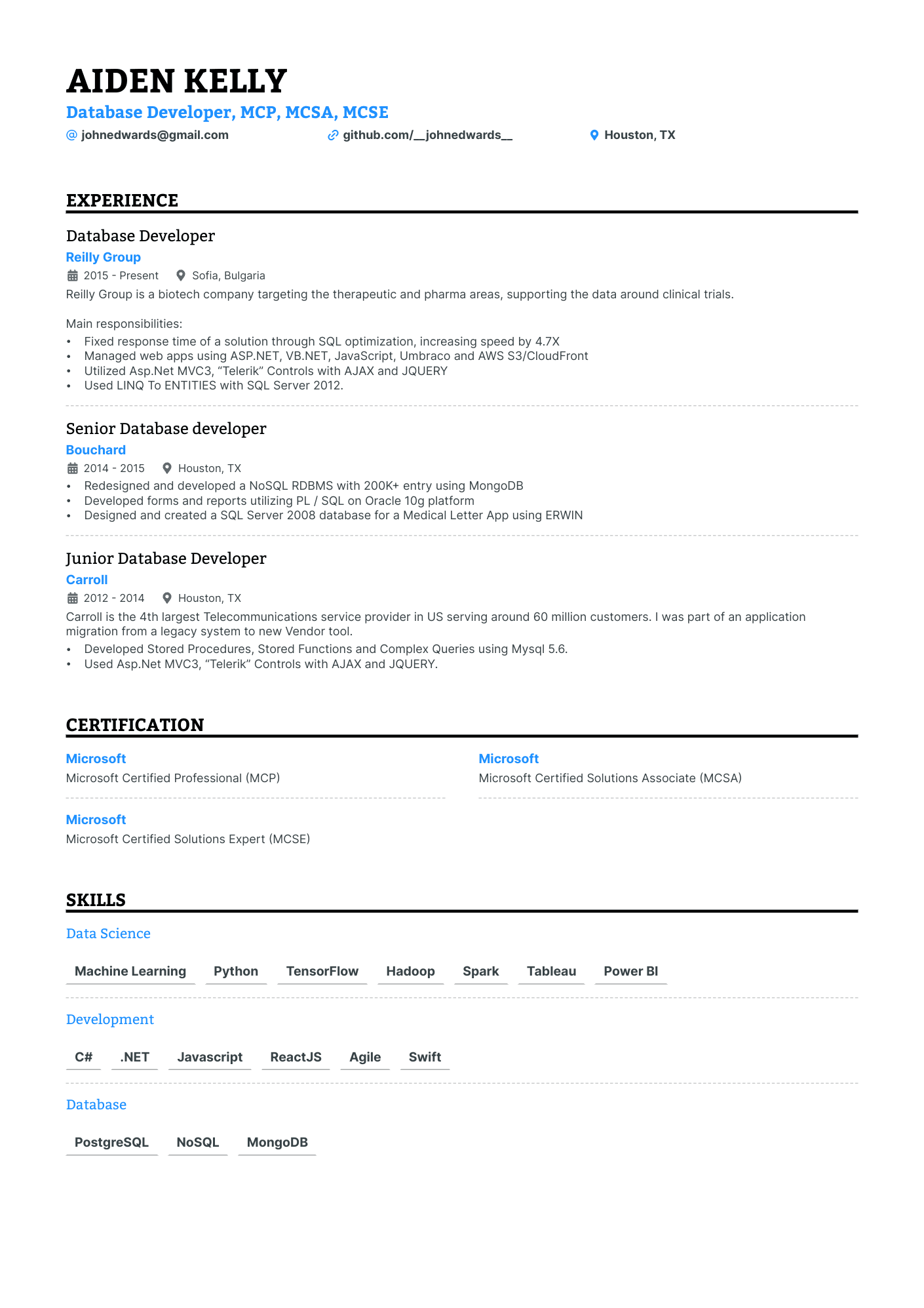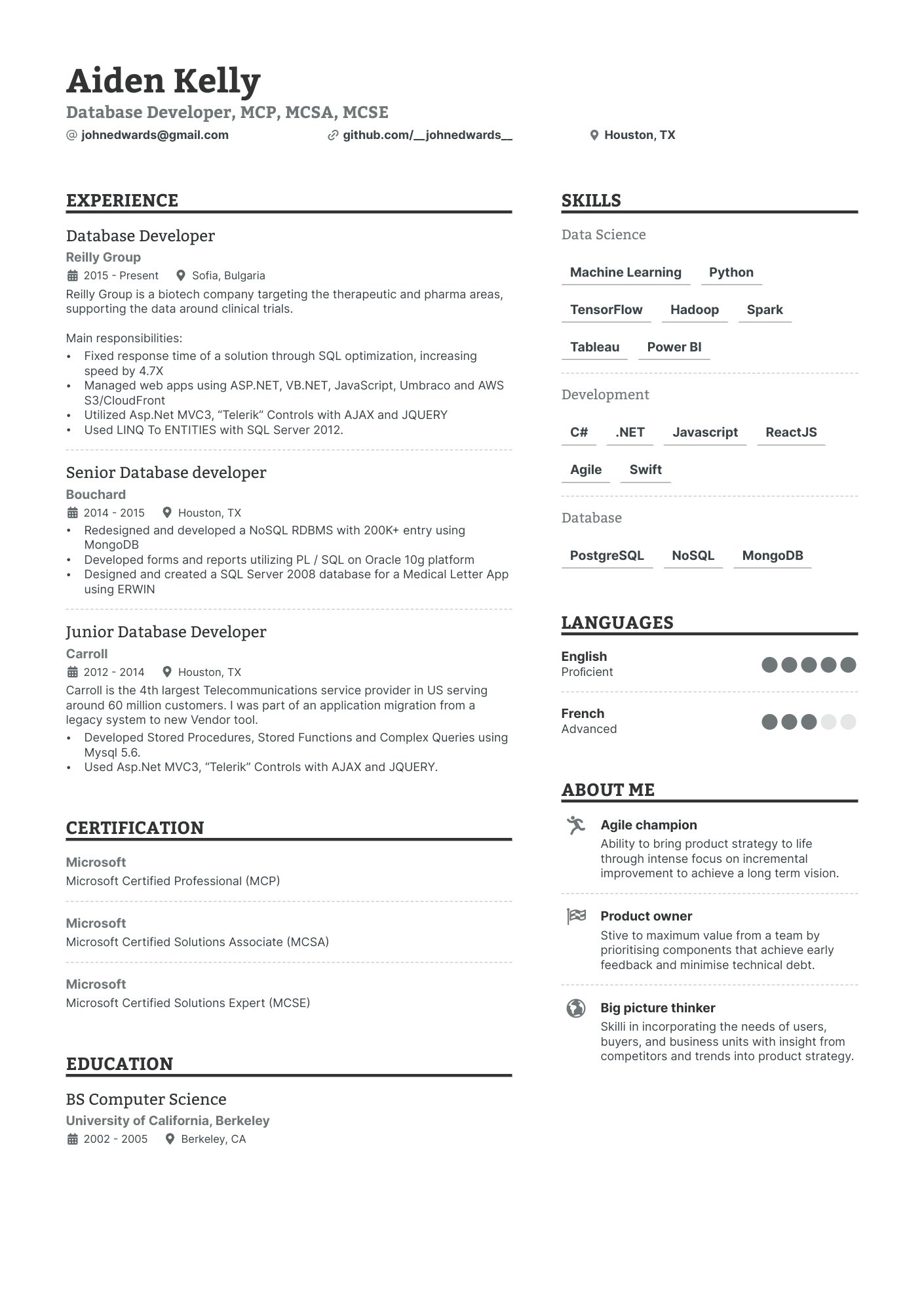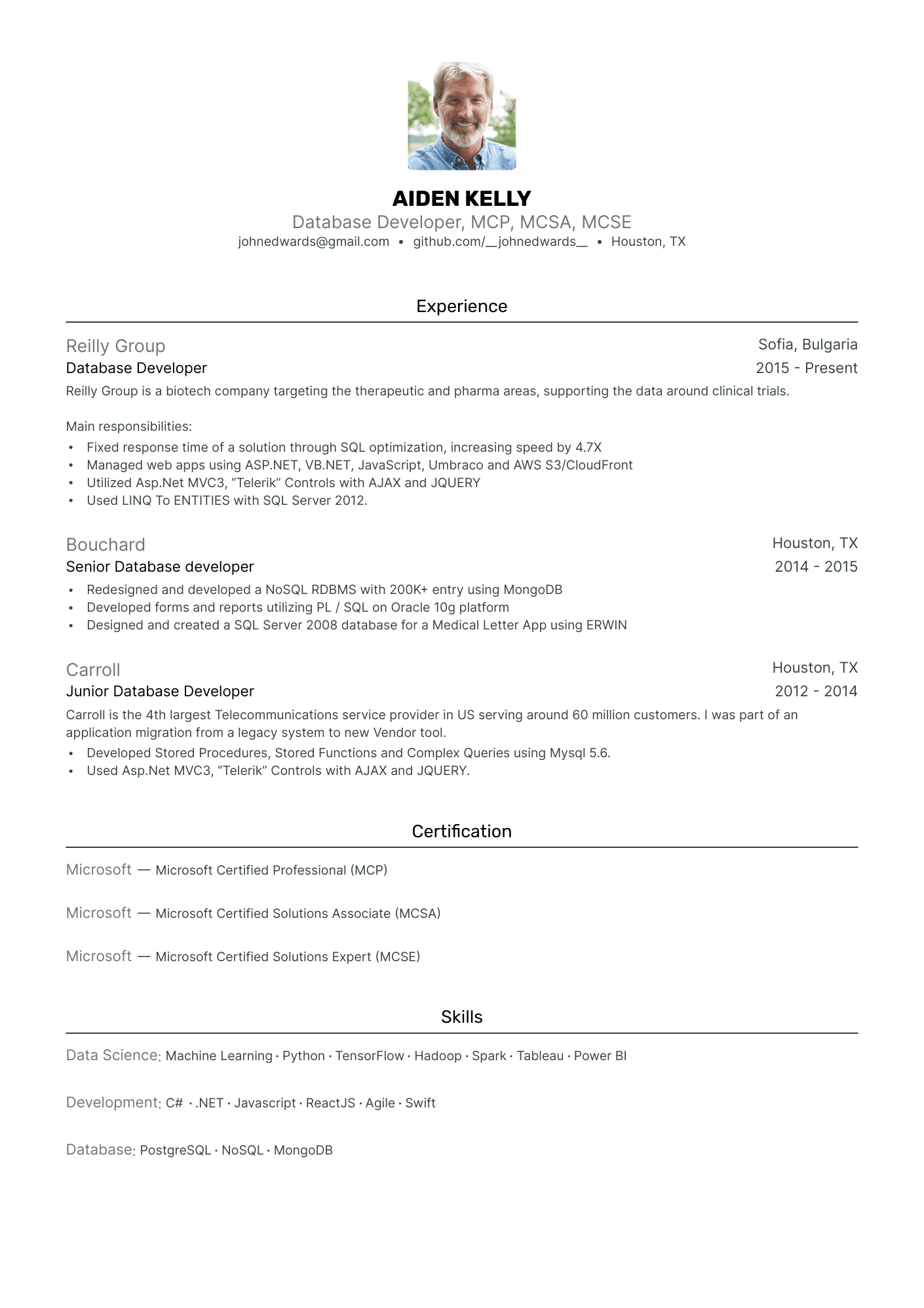“Should I de-prioritize my SQL experience for Mongodb position or should I drop it altogether?”
“What if I was working my whole life with SQL and transitioned to mongo just recently?”
Surely you’ve asked yourself these questions and more when you had to build a new Mongodb resume.
We did the research and the answers (and more) are below.
So buckle up and read below our extensive guide to writing your best Mongodb resume.
With our Mongodb resume guide, you will learn:
- How to create a resume that highlights your experience with NoSQL databases in the most efficient manner
- 8+ Mongodb resume examples that will convince recruiters you’re the one for the job
- Which skills to add to your Mongodb resume and how to make sure they are noticed
- All you need to know about perfecting your resume header and summary
- Inside tricks and tips to showcase your education and certificates
- For which jobs you should prioritize or de-prioritize your Mongodb NoSQL experience
Where should you put Mongodb on resume?
It depends. There are several good places to put Mongodb experience on your resume. Consider these factors:
- The position you are applying for
- The company you are applying for
The position you are applying for
Database Administrator, System Administrator, Full Stack Developer, and even Business Analyst positions often require knowledge of Mongodb. Although the extent of required knowledge for different positions ranges dramatically.
For example, Database Administrator jobs require working experience with Mongodb databases. Thus, that experience should be highlighted in both the experience and summary sections of your resume.
If you’re applying for certain System Administrator or a Business analyst positions, however, Mongodb proficiency often is not a requirement but rather a preferable addition. Make sure you mention it at least in your technical skills.
The company you are applying for
Some companies emphasize Mongodb knowledge for their candidates. For example, in some environments, System Administrator responsibilities can be merged with Database Administrator responsibilities.
In that case, working knowledge of Mongodb (and often several other databases) becomes a requirement. Make sure you reflect that experience in the experience section of your resume.
Often you can see those requirements in web-based startup positions as well. The main advantages of NoSQL databases are their flexibility and scalability.
Mongodb database is the most popular database according to the DB-Engine global ranking.
So when startups are looking for Full Stack Developers, for example, Mongodb expertise is often among the first skills required for a successful candidate.
So, how do you structure your resume and what template to use?
These sections are associated with successful Mongodb resumes
- Header
- Professional summary
- Experience
- Education and certifications
- Skills
Let’s move on and see what’s needed to ace all of these sections.
Here’s why you need a proper Mongodb resume header
You should spend time on your Mongodb resume header.
Let’s take a look at a generic one.
This is what your resume header probably looks like.
A few things immediately come to mind:
- You could’ve used the header to show examples of your previous work (links are a great option);
- You could’ve listed at least one more way of contact;
- You could’ve been extra careful about including Mongodb keyword in the title;
Make sure you study the company and the position and see whether the Mongodb is primary or supplementary skill required.
Even though Mongodb is amongst the top skills of this candidate, depending on the position, you may choose to omit it not to create bias or confusion.
Let’s do it one more time for a Database Admin, where Mongodb will be an essential skill for the job.
In this case, the candidate most probably is going to apply for a startup, whose systems are set in a NoSQL environment.
Showcasing Mongodb shows you can be the right person for the job.
Especially if the rest of the resume strikes the same relevancy chords.
How to make an impact with Mongodb resume summary
When you’re writing a resume summary for your Mongodb resume, there are two things that can help you make it or break it: priority and relevance.
Check if Mongodb is a primary skill or a preferable skill in the position you’re applying for.
If a company is looking for a Database Administrator for a hybrid environment but puts an emphasis on another database cluster, like PostgreSQL, or Oracle SQL, starting your summary with Mongodb experience is not a good idea.
From the job description: is looking for database administration and development professional on our database team. This person will be responsible for the current database environments, Oracle, MS SQL, MySQL, and Mongodb.
It’s better for you to show that you have a diverse experience with several databases and environments:
If the company you’re applying for is looking specifically for a Mongodb DBA, then the knowledge of other databases becomes complementary to your primary Mongodb expertise:
How to include Mongodb experience on your resume
Database Administrators are not hired to showcase what particular tools they know.
- •Proficient in Oracle 18c, Visio, Apache HTTP, C++
- •Experience using Windows Server 2003-2016
- •Strong SQL, T-SQL, and DTS/SSIS skills
Database administrators are hired to solve particular problems: scaling existing solutions, migrating and optimizing them, or developing new ones.
Often you can tell what the main focus is for each given job from its description.
Take a look at this snippet from a real job description:
- Focus on optimizing database systems for performance and reliability.
- Administer and oversee the maintenance of SQL Server and other databases.
- Optimize database systems for performance and reliability.
- Query optimization and tuning. Read, analyze, interpret and respond to execution plans by creating supporting DB objects and make/recommend specific optimization/refactoring changes.
- Provide database performance analysis resulting in specific actionable recommendations.
The first five lines give a clear idea that most of the time the potential candidate will be optimizing and maintaining the given infrastructure.
It would be a great idea to emphasize the relevant experience in the first few points of your resume in the experience section. And always scan the job description for keywords that you can use in your resume. Just don’t be repetitive, and make sure to show different sides of your work.
- •Configured, optimized and supported high availability (Replication) MongoDB cluster.
- •Optimized MongoDB CRUD Operations
- •Monitored deployments for capacity, performance, and reliability
- •Identified, troubleshot and resolved live MongoDB issues
Mongodb database came around in 2009, which is relatively recently compared to more traditional SQL-solutions. That is why most Database Administrators and companies have experience with both SQL and NoSQL database environments.
What that means is that experience with both solutions is part of most of the job descriptions and portfolios.
Although SQL and NoSQL share many similarities, they have different terminology and advantages when compared to each other.
So when you try to state that you have experience with both SQL and NoSQL databases, be very careful not to use terminology from one database approach to describe another.
- •Install and run MongoDB with multiple instances on servers
- •Configured table queries, columns and other administrative operations such as grouping, indexing, joining
Items like tables, columns, grouping and joining are used in a SQL environment.
However, in a NoSQL environment, the counterpart to tables is collections, for columns, it’s fields and grouping operation is called aggregation.
A non-technical recruiter may ignore such nuances, but to a technically experienced person you may come off as an amateur.
The only exception would be if you used GUI-tools that translated SQL-queries to a Mongodb environment, such as NoSQLBooster or SQL Query.
However, if a job description doesn’t explicitly state this workflow, you’d be better off showcasing SQL and NoSQL experience in separate operations.
- •Administered and oversaw the maintenance of SQL Server and other databases such as MongoDB, Cassandra)
- •Configured SQL Server monitoring utilities to minimize false alarms and monitored SQL Server Jobs
- •Migrated existing MongoDB clusters to new AWS infrastructure
If you are, however, applying for a Full Stack Developer position, you’ll often see that Mongodb proficiency is almost always a part of a bigger workflow.
In that case, Mongodb works in conjunction with back-end and front-end technologies (e.g. React, Node.js, CSS, HTML) and the successful candidate’s resume should reflect the experience of working in a diverse environment.
- •Developed full-stack web applications using React, NodeJS, NoSQL in distributed Serverless and Cloud Environment
- •Identified and recorded areas of the codebase that may require refactoring
- •Performing that refactoring with minimal impact on existing functionality
- •Modified existing NodeJS code and MongoDB cluster to move data from one system to another
You can’t possibly list all the skills that accompany a Mongodb experience section and, frankly, you shouldn’t.
Because if you do it, your resume starts to look like a Glossary for one of those O'Reilly books.
Use the skill section for that, and let us show exactly which skills will make your resume stand out.
Should you have a skill section on a Mongodb resume?"?
Although soft skills for developers are more or less the same, the technical skill sets will vary greatly for different positions that require Mongodb database knowledge. Here are the most important items for your resume skill section.
Listing your soft skills on your Mongodb resume
Developers rarely work in a bubble, so teamwork and communication are the key soft skills, especially when applying for an enterprise-level organization with many divisions and team projects.
10 soft skills to include on a Mongodb resume
- Communication
- Teamwork
- Approachability
- Detail-Oriented
- Analytical
- Business-Focused
- Adaptability
- Negotiation
- Patience
- Flexibility
By now, you should be aware that proper resumes exclude listing skills blindly without backing them up.
Same is the deal with your soft skills - and rightly so.
Ideally, you should list your soft skills by adding a few examples where you’ve used them.
You can do that either in a special achievements or talents section, or simply weave them in your work experience and summary.
How to include your technical skills
It’s important for certain technical skills to be present in your Mongodb resume. During the first stage of the evaluation process, ATS (Applicant Tracking Systems) will scan for keywords that match the job description.
As long as you don’t skew the truth and you list the skills you have that are present in the job description, you’ll be good to go to the next stage.
Here are the technical skills most often expected from Mongo Database Administrators.
17 technical skills to reflect your technical awareness as a DBA
Do I need education or certification sections in my Mongodb resume?"?
There’s no way to talk about education on Mongodb resumes without mentioning Mongodb university.
The platform passed 1 mln registrations in July 2018, and provides a structured curriculum for developers around the world wanting to dive into NoSQL databases.
Formal education exposes you to different experiences, builds a connection network and teaches you other transferable skills. Sometimes during your education you might have taken on a relevant course work, so make sure you mention it.
But database development is a niche you can enter largely self-taught.
So, in case you do have formal education, you can simply mention it in a separate education section. Do include:
- The name of the institution;
- The study time period
- The degree;
- The GPA score (if you think it’s relevant);
Even if you didn't finish your education you might still benefit from the experience.
When it comes to certifications, if you have more than 2 and they are fully relevant for the job, you can spend some space for their separate section.
Make sure you’ve got:
- The name of the certificate
- The year you were certified
- The certifying institution
Final takeaways
- Decide if Mongodb experience is crucial or additional for the position you’re applying for and frame your experience & summary accordingly
- Follow strict terminology when describing SQL and NoSQL working experience
- In the experience section, focus on the problems and workflows that solve them rather than just list your technical skills. Use the skills section for that.
- Prioritize Mongodb experience that is especially demanded for the position, e.g. scaling, optimizing, migrating.




